Albums
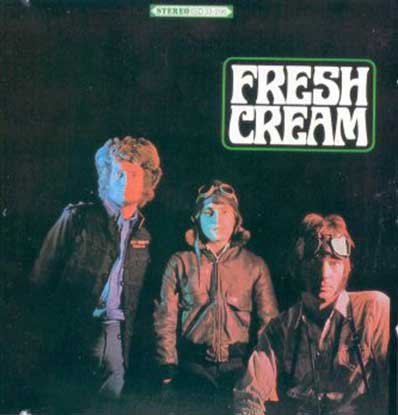
Fresh Cream
Fresh Cream, Cream's debut album, was released December 9, 1966 in the UK on Robert Stigwood's Reaction Records label. It reached number 6 in the UK charts in 1967.
Side 1
I Feel Free (Jack Bruce, Pete Brown) 2:53 U.S. Release OnlyN.S.U. (Non-Specific Urethritis) (Jack Bruce) 2:43 B-side of "I Feel Free"
Sleepy Time Time (Jack Bruce, Janet Godfrey) 4:20
Dreaming (Jack Bruce) 1:58
Sweet Wine (Ginger Baker, Janet Godfrey) 3:17
Spoonful (Willie Dixon) 6:30 U.K. Release Only
Side 2
Cat's Squirrel Traditional, arr. S. Splurge instrumental 3:03
Four Until Late (Robert Johnson) 2:07 arr. Eric Clapton, Lead vocals: Eric Clapton
Rollin' and Tumblin' McKinley Morganfield 4:42
I'm So Glad (Skip James) 3:57
Toad (Ginger Baker) 5:11 Instrumental
Wheels of Fire
CREAM 1968
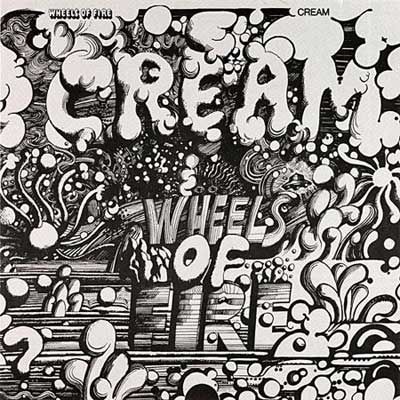
Disc one: Studio recording
Side 1
White Room (Jack Bruce, Pete Brown) 4:58Sitting on Top of the World (Walter Vinson, Lonnie Chatmon; arr. Chester Burnett) 4:58
Passing the Time (Ginger Baker, Mike Taylor) 4:37
As You Said (Bruce, Brown) 4:20
Side 2
Pressed Rat and Warthog (Baker, Taylor) 3:13Politician 3 (Bruce, Brown) 4:12
Those Were the Days (Baker, Taylor) 2:53
Born Under a Bad Sign (Booker T. Jones, William Bell) 3:09
Deserted Cities of the Heart (Bruce, Brown) 3:38
Disc two: Live at the Fillmore
Side 3
Crossroads (Robert Johnson, arr. Clapton) 4:13 (recorded March 10, 1968 at Winterland, San Francisco, CA. (1st show))Spoonful" (Willie Dixon) 16:43 (recorded March 10, 1968 at Winterland, San Francisco, CA. (1st show))
Side 4
Traintime" 3 (Bruce) 7:01 (recorded March 8, 1968 at Winterland, San Francisco, CA. (1st show))Toad" (Baker) 16:15 (recorded March 7, 1968 at The Fillmore, San Francisco, CA. (2nd show))
How Cream made Wheels of Fire...
by Felix Pappalardi
"Wheels Of Fire” by Cream was never really a planned album. While Eric, Jack and Ginger talked about ideas in England, I discussed it with Ahmet Ertugen and Jerry Wexier at Atlantic. I wanted a double album right from the beginning and it was my job to sell that idea. Nobody was high on it. When I finally convinced everyone of the double album, Cream told me they had been wanting the same thing.
Next step was helping choose material and arranging it for the final stages. With Cream this job is particularly important because most of their songs are never played until they come into the studio.
It’s very weird. The music is never discussed. It just happens. We cut the first things for the album in December 1967. We did the instrumental tracks for “White Room,” and “Born Under A Bad Sign.” They had a couple of days off during their U.S. tour so we booked studio time to get something down. Then they came back two months later for ten days and we completed the entire studio album.
We liked the track to White Room but Jack didn’t like the vocal and Eric didn’t like his guitar playing. I did a rough mix and brought it over to England for them to hear. This is where an important turn occurred.
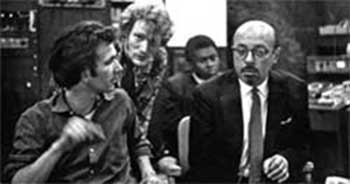
Cream told me that the only time they ever get together for rehearsal is when I'm around which is another strange thing. Anyway, while I was in England we met at Jacks house every night at seven o'clock. One night I was playing bass, Jack played a baritone horn, Ginger was playing these giant maracas and Eric was playing acoustic guitar. Eric was showing us a new tune he’d just written called Anyone For Tennis. What happened that night went into the ‘Tennis” single and the “Savage Seven” album. It was a new thing for Cream and it just happened.
Like Politician has a rhythm guitar and two overdubbed floating guitars. They crisscross from right to left in stereo. Eric wanted that and it worked. He wanted it on “Sitting On Top Of The World, too, but it didn't work there, so I changed it. I found it was very annoying. On “As You Said” Jack is recorded five times. On “Pressed Rat and Wart Hog” Jack plays two basses. The second bass comes in at the end and it’s a six string. Eric’s on three times. I’m on twice with trumpet and tonette. When I played tonette, Jack played recorder. There’s a lot of other examples too.
All the songs had finished lyrics when they came into the studio except “Pressed Rat.” We changed one line In that on the spur of the moment. Ginger writes a lot of poetry and a lot of it’s like “Pressed Rat and Wart Hog,” really groovy. Ginger wanted to fly his daughter Nettie over to recite that, but we didn’t have time. She knows that whole poem by heart.
The whole studio album was completed before we did the live album. The more we got into the studio album the more necessary it became to do the live one. The studio stuff became very electric so I wanted the live Cream right there where you could get at it, Cream as a trio without the arranging and the electronics. I presented it to Atlantic in this exact way.
At first it was going to be set up so you could buy one or the other and that led to a whole bunch of things. I stayed with Jack while I was there and we were always playing things to each other. We even purchased some new instruments and Jack picked up a cello. I had a viola and we wrote some pieces for them and played a lot trying to get our chops back. That came out of the clear blue, just an exchange of musicianship and personalities.
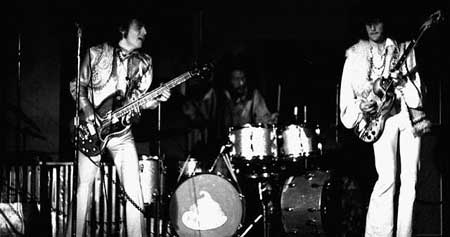
So, the classical things you hear on the album are not all my doing. Jack has had as much classical training as I have. It’s not so much his cello playing as it is the literature he’s absorbed since his childhood. He is certainly a qualified musician and knows music thoroughly. So this classical influence was a dual effort.
I also found that Ginger was into a lot of things I never knew before. He’s very classically oriented. Rhythmically he’s very African but melodically hes very classical. He writes like Vaughn Williams. Usually he collaborates with a guy named Mike Taylor. Everybody thinks that Ginger is just a drummer, but he’s much more.
There are a lot of guys that work with Cream. Like Pete Brown collaborates on almost all of Jack Bruce’s songs. Mike Taylor is an ex-British jazz pianist with a strong classical background.Cream had done a lot of work on songs among themselves, but we made some changes in the studio too. Like on “Passing The Time,” nobody knew what instrumentation to use and it got bogged down.
One night Ginger got me out of bed with a long distance phone call from England and played me the melody on an organ. That sound stayed in my head so when I finally saw him in the studio I called up a music shop and ordered a callope. Jack, who is a fantastic keyboard player, did the song on caliope and I played organ pedals.
We got very excited over “Passing The Time” and finally completed it. It was beautiful. We had the freedom to do what we wanted without any planning. With incredible Tom Dowd running the tape, we could completely forget about the engineering and just concentrate on the music.The album got bogged down in a lot of places because Cream was working very hard on tour.
They were tired and they just wanted to get away.The last thing we did on the studio album was the vocal track for “Those Were The Days.” Jack heard the tune six weeks later and he said, “Wow, what a groovy tune. I don’t think I know that one.” That’s how tired they were, We used every single track we made. We didn’t throw anything away. We approach tunes with a great deal of enthusiasm and thought so there isn’t any waste. There’s a lot of thought behind the tunes but very little chatter.
We were thinking of putting brass on “Born Under A Bad Sign” but decided against it. Somebody at Atlantic took the Cream track when I wasn’t there and overdubbed some King Curtis horns. I didn’t like It, but I let Cream hear it and they didn’t like it either. I m glad It didn t work out because there are no studio musicians at all on this album.
I'd say we worked for a good two weeks on the studio album. Sometimes we’d work till four in the morning if It was cooking. Maybe only one guy was cooking so I’d send Jack and Eric home and just work with Ginger or percussion things. On “Deserted Cities Of The Heart” nobody was in the studio except Jack, his wife Janet, Tommy Dowd, myself and my wife, Call.
It was Jack’s tune and he knew what he wanted. We just played cello and viola that night. We did lots of overdubbing which is one of the things that makes a great deal of difference between the art of recording and the art of a live performance. They are two separate things. This is why we wanted the two album set.
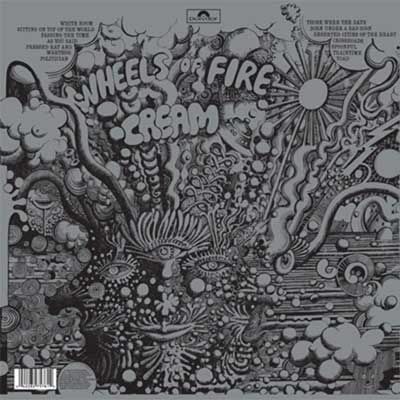
Jack Bruce, Composing Himself
by Harry Shapiro (Jawbone:2010)
Being an authorised ‘biography’, this is a highly researched account of Jack Bruce’s life & gives us far more information about the album that the other two!... we know the live part of the record was recorded on the first leg of Cream’s 1968 U.S tour...
After this, they went back to Atlantic “finishing off what was originally intended to be just a studio album” ...by now the problems in the band were legendary & a split was inevitable... engineer Tom Dowd is reported as saying “that there were times during playbacks ‘when I thought they were going to kill each other’” (Shapiro,H pp111). This seems likely to have been tension between Jack Bruce & Ginger Baker, as Eric Clapton never got involved in violent confrontation.
According to Shapiro’s book it was Felix Papparlardi “who rightly believed that to ignore Cream’s live performances would mean giving only a partial view of the band, so he pushed for them to release a double album”......one that we now know was destined to become the first double-platinum LP in music history! Eric Clapton, The Autobiography by Eric Clapton with Christopher Simon-Sykes (Century:2007).
Eric Clapton’s autobiography fails even to mention the album by name... most of his recollections of his time in Cream seemed coloured by musical frustrations, worry over the personality clashes between his other two band-mates & the stress of overwork.
“Whistle stop touring America was the beginning of the end for Cream, because once we started constantly working in such an intense way, it became impossible to keep the music afloat & we began to drown.” (Clapton, E pp100) Sadly, millions of adoring & appreciative fans did not agree.
For Eric it was all about new influences he could be exposed to, without perhaps fully realising that those he Ginger & Jack had already ingested were creating a new & more powerful cultural influence than any he could find in existence!
Hellraiser, The Autobiography of the World’s Greatest Drummer by Ginger Baker with Ginette Baker (John Blake:2009). In chapter nine of his book, Ginger Baker says “In February 1968, we flew out to Atlantic Studios to record Wheels of Fire” (Baker,G. Pp117).
In true Ginger style this is immediately followed by a story about him picking up an air stewardess from his first class seat on a Pan Am jet!
Like Eric Clapton, he too believes that the music suffered from the strain of touring, with the addition of the complaint that the volume created by the enormous stacks of Marshall Amps (everyone of them turned up to eleven!) permanently damaged his hearing & also was “where all that smash, bash, drumming came about” (pp.118) Ginger cites a gig on the subsequent tour as being the one in which he & Eric decided to call it a day...